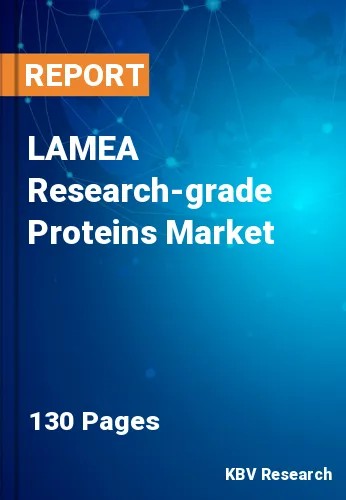The Latin America, Middle East and Africa Research-grade Proteins Market would witness market growth of 17.7% CAGR during the forecast period (2023-2030).
Protein production is a time-consuming process that frequently necessitates intensive maintenance of operating conditions. Even though the demand for these recombinant products is high and growing, regulatory bodies are still evolving at a slow rate. Typically, these proteins are produced using a host or expression system in which the gene that produces the desired product is expressed via transfection, bacterial transformation, or viral transduction. This complex procedure frequently results in the over-expression of non-targeted regions and requires additional time.
The market has steadily grown due to increased research activities in various scientific disciplines. Factors such as proteomics, genomics, and drug discovery advancements have contributed to this growth. These encompass many products, including recombinant proteins, native proteins, monoclonal antibodies, enzymes, and growth factors. These proteins can be derived from various sources, including bacteria, yeast, mammalian cells, and plants. These proteins are used in diverse applications, such as drug development, functional studies, structural biology, biomarker discovery, and diagnostic assay development.
The market in LAMEA has been experiencing growth, driven by increasing investment in life sciences research, biotechnology advancements, and the expansion of pharmaceutical and academic sectors in the region. Several countries within the LAMEA region, including Brazil, South Africa, and the United Arab Emirates, have been actively investing in their biotechnology and pharmaceutical sectors. These industries are major consumers of research-grade proteins for drug discovery, development, and clinical research. LAMEA is home to numerous academic and research institutions conducting research in various scientific disciplines.
The Brazil market dominated the LAMEA Research-grade Proteins region, by Country in 2022, and would continue to be a dominant market till 2030; thereby, achieving a market value of $38 Million by 2030. The Argentina market is showcasing a CAGR of 18.3% during (2023 - 2030). Additionally, The UAE market would register a CAGR of 17.4% during (2023 - 2030).
Based on Host Cell, the market is segmented into Mammalian Cells, Bacterial Cells, Yeast & Fungi, Insect Cells, and Others. Based on Product, the market is segmented into Cytokines & Growth Factors, Immune Checkpoint Proteins, Enzymes, Hormones, Antibodies, Virus Antigens, Recombinant Regulatory Proteins, and Others. Based on End-use, the market is segmented into Pharmaceutical & Biotechnology Companies, Academic & Research Institutes, and Others. Based on countries, the market is segmented into Brazil, Argentina, UAE, Saudi Arabia, South Africa, Nigeria, and Rest of LAMEA.
Free Valuable Insights: The Worldwide Research-grade Proteins Market is Projected to reach USD 2.5 Billion by 2030, at a CAGR of 15.2%
The market research report covers the analysis of key stake holders of the market. Key companies profiled in the report include Thermo Fisher Scientific, Inc., Abcam Plc, Miltenyi Biotech B.V. & Co. KG, Genscript Biotech Corporation, Bio-Techne Corporation, Proteintech Group, Inc., AcroBiosystems INC., Sino Biologicals, Inc. and ProSpec-Tany TechnoGene Ltd. and New England Biolabs, Inc.
By Host Cell
By Product
By End-use
By Country
Our team of dedicated experts can provide you with attractive expansion opportunities for your business.

